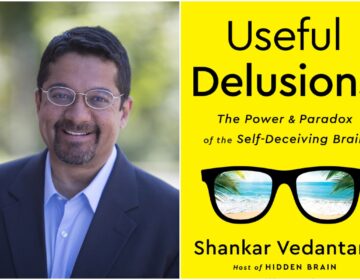Shankar Vedantam on why we lie to ourselves
Host of the Hidden Brain podcast, Shankar Vedantam discusses his new book about why we lie to ourselves and the risks and benefits of self-deception.
Listen 49:00
(photo credit, Douglas Sanders/NPR)
Sometimes, honesty isn’t the best policy. We all tell lots of little lies each day, to ourselves and to sustain the relationships around us with family, friends, and co-workers. SHANKAR VEDANTAM, host of the Hidden Brain, explains that self-deception is central to our survival as a species and is even built into our brains. In his book, Useful Delusions: The Power & Paradox of the Self-Deceiving Brain, co-authored with Bill Mesler, Vedantam lays out the social, psychological and biological role that lying to ourselves plays, how it has allowed the human race to flourish, and the problems that can occur when the impulse runs amok.

Subscribe for more Radio Times
Interview highlights:
On speaking your mind
Shankar Vedantam: You could make the case that if you’re a rational, logical person, why can’t you simply say everything that’s on your mind? Why can’t you simply voice every thought that goes through your head? And of course, we quickly realized that if we did that, we would often say things that are cruel or unkind to other people. And we often have to temper the desire to speak the truth with a desire to in some ways present what we say well.
On delusion and privilege:
SV: I know speaking just for myself, I have told myself through the last 12 months of the pandemic, every month I have said, you know, liberation is one month away. And the fact that I told myself liberation is one month away might be a delusion, but it’s been a useful delusion in the sense that it’s helped me psychologically cope with the difficulties of the pandemic. This is one of the deep insights that I’ve tried to explore in the book that, in some ways, the ability to do away with delusions, to stand away from beliefs, could be seen as an act of privilege. If your life does not lack for things, it’s easy to look down on people who reach for beliefs because their lives, in fact, are vulnerable or they’re experiencing anxiety.
On demagogues:
SV: Yes, we should confront demagogues. We should fact check them. We should do what the news media is doing. But in many ways, the story that demagogues tell is appealing because it’s speaking to people’s underlying psychological needs. If you don’t address those underlying psychological needs, yes, you might get rid of one dictator, one demagogue. But the next one is right around the corner.
WHYY is your source for fact-based, in-depth journalism and information. As a nonprofit organization, we rely on financial support from readers like you. Please give today.





